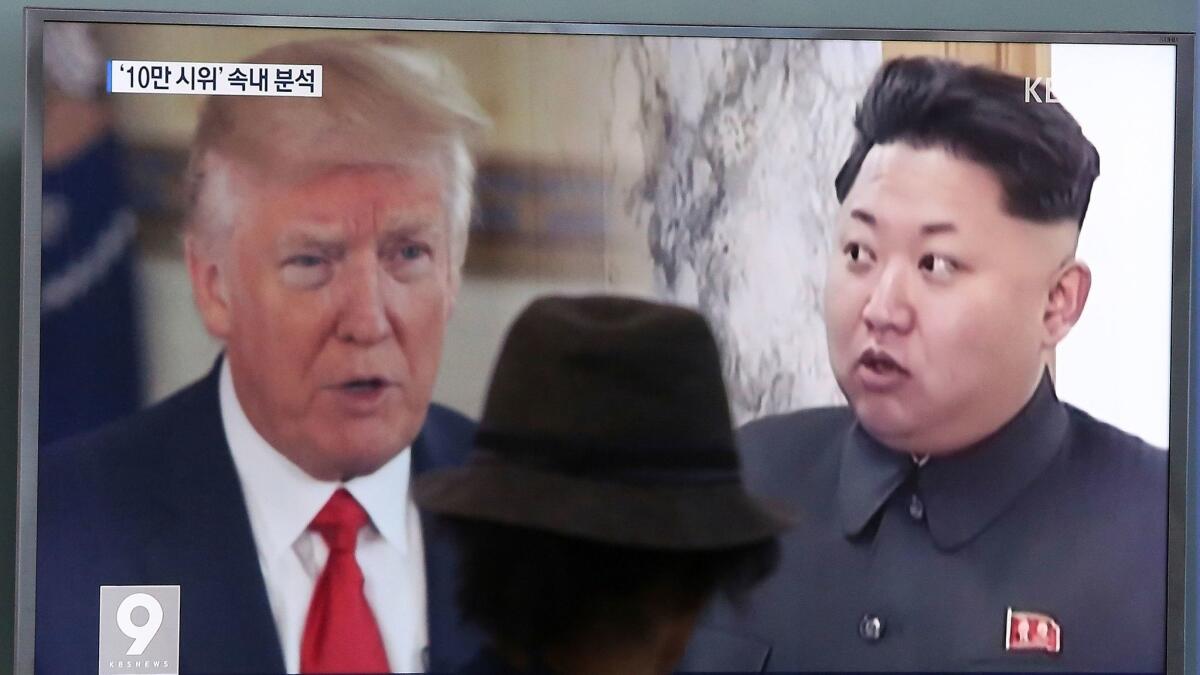Newsletter: Donald Trump, crazy like a Kim

Good morning. I’m Paul Thornton, and it is Saturday, Aug. 12, 2017. It’s World Elephant Day — yes, that’s a thing, and people celebrate it (as they should). Let’s take a look back at the week in Opinion.
The nightmare scenario envisioned before
But whereas most of us might be unsettled, to put it mildly, by the prospect of the normally stabilizing American presidency becoming increasingly unmoored rhetorically, UCLA law professor Russell Korobkin believes it may be just what the United States needs to break its decades-long stalemate with North Korea. He writes in a Times op-ed article:
As I tell students in my negotiation class, in hard-nosed, brass-knuckles bargaining, the crazy person wins because he can force a rational counterpart to make concessions in order to avoid mutual disaster. And no one does crazy like Trump.
So-called normal American administrations have been outfoxed by the Kim family for decades. The reclusive leaders of the Hermit Kingdom have known that the only thing the United States can do to prevent them from developing nuclear weapons and long-range ballistic missiles to carry them is to start a war that would devastate the Korean peninsula. That option was, and is, so bad that the Kims have calculated that they could bluster, stall, make agreements only to break them, and generally thumb their noses at the West with no risk of serious consequences....
North Korea’s threat to take “physical action” and retaliate “thousands of times over” for the latest sanctions was bluster typical for that country’s propaganda ministry. But Trump’s “fire and fury” rejoinder is in sharp contrast to America’s usual careful diplomatic language. Military and foreign affairs experts in the West have uniformly criticized Trump. When crazy goes toe to toe with crazy, escalation can potentially get out of hand and lead to war. North Korea has already raised the ante by specifically threatening to shoot missiles near Guam, which could trigger an American response.
But the obvious danger of Trump facing off with Kim is precisely why rational Chinese leaders might reassess their nation’s long-standing approach and intervene more decisively.
The Times Editorial Board is less comforted by Trump’s rhetoric. It wanted something other than the president’s statement on Thursday that perhaps his “fire and fury” remarks were not tough enough. (Interestingly, earlier in the week, the editorial board praised the Trump administration for appearing to favor diplomacy over bluster in dealing with North Korea — the lesson being that Trump doesn’t often end a week as he started one.) Michael McGough, The Times’ senior editorial writer, reminds us that Trump isn’t known for his precise use of language, so we should not freak out over “fire and fury.”
The U.S. also has to worry about China’s military strength. During the Korean War more than 60 years ago, the scrappy People’s Liberation Army pushed U.S. forces south on the peninsula and forced a stalemate. Now, warns Harvard professor Graham Allison, China’s military is far more prepared and able to defend its interests in North Korea if the U.S. decides to intervene. L.A. Times
A memo from the West Coast to Trump: We don’t want to get hit by a North Korean nuke, so please cool it with the overheated rhetoric. Timothy Egan concedes that voters in California, Oregon and Washington state overwhelmingly favored Hillary Clinton in 2016, and therefore the thought of us melting in a nuclear attack might not tug at the president’s heartstrings much. But we’re still Americans who expect our government to defend us — or at least not to tempt
But if a North Korea nuke should strike California, we’d be prepared (for the aftermath, at least). In an interview with The Times’
Way back before the threat of nuclear war increased, the week’s big story was that Google memo. The Times Editorial Board notes that Google, despite what the memo writer said critically about its efforts to diversify its ranks, is no poster child for hiring and promoting more women and minorities. Melissa Batchelor Warnke, a former Google employee, writes that the sexism at tech companies is far more insidious and pervasive than outsiders might believe and perhaps less obvious to male employees. Cassady Rosenblum points out that despite everything Google says about wanting greater diversity, the company has not articulated exactly what it hopes to achieve by having more women and minorities in its workforce.
Reach me: paul.thornton@latimes.com
Start your day right
Sign up for Essential California for news, features and recommendations from the L.A. Times and beyond in your inbox six days a week.
You may occasionally receive promotional content from the Los Angeles Times.




